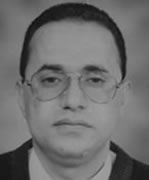
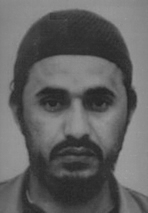
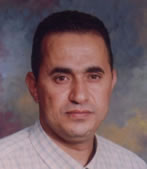
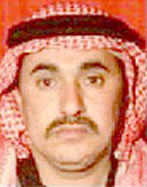
| THINK-ISRAEL |
| HOME | Nov-Dec 2005 Featured Stories | Background Information | News On The Web |
The Many Faces of Abu Musab al-Zarqawi
All but the last are from Rewards For Justice page. The last one (Bottom Right) appears to be the most recent one of him.




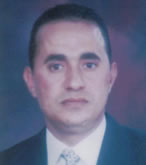
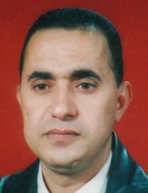
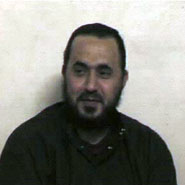
On May 25, 2004, the world watched in horror as American Nicholas Berg was beheaded, the first in a series of hostage beheadings executed by an Islamic jihadist (i.e., terrorist) group in Iraq; a live video clip was posted on the Internet. Behind the victim stood four masked men, one of them reading aloud from Berg's "execution sentence" and warning Westerners to get out of Iraq, threatening that they would suffer the same fate. Immediately thereafter he took a long knife from his garment and shouting "Allahu Akbar," cut off Berg's head and held it up before the camera.[1] Reportedly, the executioner was Abu Musab al-Zarqawi, head of the Islamic group then known as Al-Tawhid wal-Jihad (Unity of Allah [the Muslim divinity] and Holy War). That incident and others that followed have given al-Zarqawi the reputation of being the most dangerous Sunni Muslim terrorist in post-Saddam Hussein's Iraq.
As of this writing,[2] attempts to determine exact biographical details about al-Zarqawi and his activities meet with extreme difficulty because of the lack of reliable, scholarly data. Therefore, the information (particularly the biographical) in this section is based on a new, comprehensive English biography written by Dr. Loretta Napoleoni.[3]
Ahmad Fadheel Nazaal al-Khalaylah ("Abu Musab al-Zarqawi" is his nom de guerre) was born in Zarqa, Jordan in October 1966. He came from a large family belonging to the trans-Jordanian Bani Hassan tribe, which is known for its loyalty to the royal Hashemite family. He grew up in the al-Ma'ssoum slum, was an indifferent student and spent most of his time in the municipal cemetery (located opposite his home), which served as his playground. He was known for being rebellious, got left back at school and turned into a juvenile delinquent, even spending time in jail.
During the 1980s (after his release from jail) he was influenced by the radical Islam of the Salafist-Jihadist movement developing in Jordan at that time, particularly in Zarqa. The local movement was headed by 'Abdallah 'Azzam, Abu Muhammad al-Maqdisi and Abu Qatadah (all of them of Palestinian-Arab extraction, most probably from the West Bank; see below). Al-Zarqawi was captivated by the heroic stories he heard at the local mosque[4] about the operations of the Afghan Arabs, the term used to describe various Muslim Arabs who joined the jihad against the Soviet Union. In 1989 the Jordanian government, in all probability happy to be rid of him, allowed him to leave for Afghanistan. He arrived there in the final days of the war and his acclimatization was relatively long. He felt alien[5] and kept in close contact with his family. Initially he lived in the city of Khost, where he met veteran "Afghan Jordanians," but later moved to Peshawar.
While in Peshawar he became a devout Muslim and follower of 'Issam Muhammad Taheral-Barqawi, better known as Abu Muhammad al-Maqdisi. During the 1980s, al-Maqdisi's activities were impeded by the Jordanian authorities. Consequently, he moved to Afghanistan. The third figure who influenced al-Zarqawi with sheikh Omar Mahmoud Abu Omar, known by his nickname, Abu Qatadah. Abu Qatadah, who eventually sought and found political asylum in Britain, is considered the main ideologue of various radical Islamic movements, mainly in Europe, and as the advisor of many of their operative leaders (e.g. Muhammad 'Atta, who led the perpetrators of the September 11, 2001 attacks from a secret cell in Hamburg).
During his stay in Afghanistan, al-Zarqawi received ideological and operational training at the Sada camp, which was established by 'Abdallah 'Azzam (who died in a car bomb explosion in 1989). However, he did not join Al-Qaeda and (for a short, marginal period) preferred to act alone. In 1993 he returned to Jordan and joined the Islamist activity directed against the legislative efforts of the late King Hussein (aimed at clipping the wings of the Islamic movement gaining strength in Jordan at the time) and against Jordan's entering into the peace process with Israel. In 1994 he was arrested along with al-Maqdisi, who had also returned to Jordan and led the aforementioned Islamist activity. In 1995 both were sentenced to 15 years in the Sawaqah prison (they were in fact released in 1999).
While in prison, al-Zarqawi suffered both physical and mental anguish (including various periods of solitary confinement). To overcome his suffering, he engaged in a private régime of physical exercise to strengthen his body while also intensively studying the Qur'an and other classic Islamic sources. He gradually became the leader of the prisoners who shared the world view called al-tawhid wal-jihad. This ideology, articulated by al-Maqdisi, determines that the unity of Allah is absolute and serves as the foundation for the creation of a unified Islamic society based on the establishment of a strict adherence to Islamic sharia (religious law) in all areas of life. Any individual opposing it is considered an infidel whose fate is a death sentence.
In May 1999 al-Zarqawi was released from prison[6] by the newly-crowned king of Jordan, 'Abdallah the Second, the son of the late King Hussein, who had died in February of that year. At the end of 1999 the Jordanian government permitted al-Zarqawi to leave for Afghanistan for the second time. He originally intended to join the jihad in Chechnya, led by Samir Saleh al-Suwaylem, nicknamed Khattab (a Muslim mujahid who was killed by the Russians in 2002) and Shamil Basayev (a Chechen, whose death has been reported but never verified).
However, he was detained in Pakistan, where he was staying on his way to Afghanistan, because his visa had expired. His passport was confiscated and the Pakistanis demanded he return to Jordan, but nevertheless he managed to reach Afghanistan. At the beginning of 2002 he met Osama bin Laden in Kandahar but rejected his offer to join Al-Qaeda, at the timenot showing interest in pursuing a jihad against the United States. However, he did accept the suggestion proffered by Muhammad Makawi,[7] bin Laden's head of security, to set up a training camp for his men (some of whom came from Jordan and others who became his followers in Afghanistan) at Herat.
The camp at Herat became his stronghold, and it was there that he changed his name to Abu Musab[8] al-Zarqawi: Abu Musab ("father of Musab," his fourth son, and the name of one of the prophet Muhammad's most famous warriors and companions),[9] and al-Zarqawi, because he came from the city of Zarqa (a hotbed of radical Islam in Jordan, as noted). He became the leader of the Afghan Arabs who trained in the camp and were called Jund al-Sham ("the army of greater Syria")[10], as well as of the Kurdish, Iraqi and Syrian Muslims who wanted to join the jihad in Chechnya.
In the wake of the American bombing of Afghanistan in October 2001, al-Zarqawi fled with his men (and family). His escape was dramatic but orderly, with no serious casualties, through Kandahar to Pakistan, and it turned him into an admired figure. The women and children were sent to Turkey and the men went to Iran, where they were the guests of Gulduddin Hikmatyar, one of the leaders of the opposition to the Taliban who had received asylum there. However, at the beginning of 2002, apparently as a result of American pressure, the Iranians closed his bases and arrested more than 20 of his followers.[11] That accelerated his plans to reach northern Iraq and settle in the area controlled by his Islamist Kurdish supporters[12] and to set up two training camps there.
When Iraq was occupied by the United States and its coalition allies (March-April 2003), al-Zarqawi abandoned his goal of overthrowing Arab régimes in the Middle East (starting with his homeland, Jordan) and became one of the central figures in declaring jihad (holy war) on the Americans and coalition forces in Iraq and on their supporters within the local population. They wanted, he claimed, to institute "the great lie known as democracy," which was diametrically opposed to Islam. However, his name had previously arisen in connection with terrorist activity in Jordan, i.e., the murder of the Israeli diamond merchant Itzhak Snir in August 2001, and the murder of the American diplomat Laurence Foley in October 2002. For those two acts he (and ten of his followers) were sentenced in absentia to life imprisonment.
He was also mentioned by Colin Powell, the former American Secretary of State, in a speech delivered at the United Nations in February 2003, as operating under the aegis of Saddam Hussein's régime, which Powell claimed indicated a alleged connection between Iraq and Al-Qaeda. His name was even linked to the lethal attacks in Casablanca in May 2003 and Madrid in March 2004, attributed to Al-Qaeda operatives. However, no unequivocal proof was found of his involvement in international terrorism.
In any event, beginning in the spring of 2003 al-Zarqawi appeared as the leader of the jihad in Iraq, against both the US-led coalition and -- mainly -- against Iraqi civilians and military personnel thought to collaborate with the coalition forces and the new Iraqi régime. Special emphasis was put on the Shiites, with the intention of fomenting a civil war in Iraq. Thus, in effect, he adopted the extremist Sunni Muslim worldview[13] developed by Dr. Ayman al-Zawahiri (leader of the radical Islamic Egyptian terrorist organization Al-Jihad, a high-ranking member of Al-Qaeda and Osama bin Laden's right-hand man) based on the theories of Sayyid Qutb (one of the most radical ideological leaders of the Egyptian Muslim Brotherhood, who was executed by the Egyptian authorities in 1966) and Dr. 'Abdallah 'Azzam (a Palestinian Arab and bin Laden's mentor, as noted above). According to their ideology, killing Muslims (including Arab rulers) is permissible if they do not follow the strict rules of the shari'ah (i.e., Islamic law), are considered corrupt and act against the extremist Sunni Muslim view, or against those clerics who refuse to join the jihad, which should be seen as the personal duty (fardh 'ayn) of every Muslim.[14]
Al-Zarqawi explained the core of his worldview in two tracts he wrote in Arabic early in 2004. The (unsigned) first one, apparently written in February, was found in his personal computer and sent, according to its contents, to bin Laden and Ayman al-Zawahiri. The second was issued in April via the Internet and signed by him as "a voice calling to the Islamic nation," and contained phrases which had appeared in the first tract; he later issued similar written and spoken announcements.
Both documents are written in classical, rhetorical Arabic, although they contain familiar "Western" expressions whose terminology is modern. They show that al-Zarqawi (or one of his main supporters, if he did not write them himself) is (or was) quite fluent in Arabic and familiar with traditional Muslim literature such as the Qur'an, the Sunnah, or hadith (the oral tradition), poetry and various tracts and treatises written by leading medieval Muslim scholars. Thus it is obvious that the author and his two correspondents have a great store of knowledge about both classical Arab-Muslim scholarship and modern Arab and Western political culture -- unusual for rank and file Muslim jihad warriors, including members of Al-Qaeda. Thus it can be assumed that the documents are authentic, unique, and an accurate reflection of his strategy. In the aforementioned tracts (and in others) al-Zarqawi explains his fierce hatred of Americans and approves of shedding their blood, as well as that of many Muslims in Iraq, particularly Shiites, whom he calls al-rafidhah (a pejorative Sunni-Muslim term for those who rejected the first three Caliphs and their right to rule). One of the results was his involvement in the perpetration of many terrorist acts (for which he took responsibility), most of them suicide and car bombing attacks. Among them was the attack believe to be perpetrated by Yassin Jarrad, the father of al-Zarqawi's second wife, against the Imam 'Ali Shiite mosque, located in Najaf, Iraq, in August 2003, in which 123 Shiites were killed, among them their spiritual leader, the Ayatollah Muhammad Baqir al-Hakim. He was described in al-Zarqawi's second tract as collaborating with the Americans and regarding the jihad in Iraq as terrorist activity and political sabotage (and therefore punished).
Most of al-Zarqawi's terrorist activities were carried out in the area known as "the Sunni triangle," which centers around Fallujah, but he also operated in the Baghdad district. As a result, the American army (supported by Iraqi forces) began a large-scale, concerted attack on Fallujah (April-November 2004) with the aim of capturing al-Zarqawi, but he was not apprehended and so far has remained at large, despite other American operations.
He thus became a hero of the global jihadists in general and the Iraqi jihadists in particular. Towards the end of December 2004 bin Laden even referred to him as "the head [or representative] of Al-Qaeda in the land of the two rivers [i.e., the Tigris and the Euphrates, that is, Iraq]" (amir qaedat al-jihad fi ardh al-rafidayin). That title subordinated him to bin Laden, which he had previously avoided. However, he was thus transformed from being the leader of a local Islamist group, Jama'at al-Tawhid wal-Jihad, into a representative of the head of the global jihad. In practice he became Terrorist Number One, and the American government put the same price on his head as on Osama bin Laden's ($25 million).
In general, al-Zarqawi's tracts outlining his strategy present an extremist Sunni Muslim ideology (reflected in the name he gave his organization, Al-Tawhid wal-Jihad, "the unity of Allah [monotheism] and holy war"). Its doctrinal element is based on medieval Muslim-Arab sources, intended primarily to ensure a firm Sunni Muslim foundation for his rough treatment of Shiites, especially Iraqi Shiites. With that end in view, he surveyed the history and deeds of the Shiites in Islamic history. He based his outlook on the negative views expressed by respected medieval Sunni Muslim clerics and scholars regarding Shiites, such as Taqi al-Din Ahmed ibn Taymiyah (1263-1328, who issued a fatwa authorizing the killing of the Mongols, even though they became Muslims, for not following the strict rules of the shari'a) and Ahmad bin Hanbal (780-855, Muslim scholar and theologian, very devoted to traditional views and opposed to innovations in Islamic law and the founder of the strictest recognized school of Sunni Islam). He referred especially to the way the Shiites "distorted the Qur'an" and became outcasts of the Sunni Muslim nation, with respect to both religious worship and collective identity. Hence due to their unforgivable treachery in the past,[15] they were to be shunned and killing them was justified.
A corollary of that is his defamation of Iraqi Shiites, whom he calls "the scum of the earth," "the Christian seed planted by the Jews in the soil of Amgush" (the ancient Iranian pre-Islamic polytheistic faith), "poisonous snakes," "deadly poison," "a bone in throat," traitors, infidels, etc. Moreover, in his opinion the Shiites are a fifth column and with the Sunni Muslims who support the Americans, especially the remnants of Saddam Hussein's [Sunni Muslim but secular] régime, they are attempting to install a new Shiite administration in Iraq, anti-Sunni and pro-American. That is, the doctrinal foundation of his ideology serves the purpose for which he composed the tracts: it provides ample justification for killing Shiites to force them to take revenge on the Sunnis and to foment a bloody civil war in Iraq which will undermine public order and prevent the establishment of a new régime (hostile to him and his followers).
Despite the deep hatred he feels for the Americans in Iraq, he has an ambivalent attitude toward them:
On the one hand, he views them as "a huge army of [modern] Tatars (Mongols)," which occupied Iraq both to erase the Arab nation and to assure security for the United States' favorite country, Israel. That is, the Americans are the new Crusaders, and together with the Jews are the enemies of the Muslim ummah(community of believers or nation), an echo of the International Islamic Front for Jihad on the Jews and Crusaders, founded by bin Laden in February 1998. He is also of the opinion that they are easy targets because they are so widely deployed in Iraq, a country they are unfamiliar with, and thus it is easier to attack them.
On the other, he admits that American intelligence information regarding elements such as himself grows continually, and they know that he and his men have no intention whatsoever of leaving Iraq, merely of deploying and conducting their affair from bases removed from the front. Therefore, collaboration between the Americans, Shiites and Sunnis (including Kurds) enables them to curtail the activities and movements of his followers. Thus, in light of his sober evaluation that he and his men do not receive actual support -- with the exception of polite hospitality and expressions of solidarity -- from Iraqis (especially from Muslims who are Sunnis like him but not necessarily extremists), he was apprehensive that they would not be able to stop the (currently temporary) establishment of a new régime in Iraq.
In addition to his hatred for the United States, his tracts are clearly prejudiced against Israel and the Jews. His ideas were nourished in all probably by the anti-Semitic and anti-Israeli Arab and Muslim literature prevalent in the Arab-Muslim world.[16] For example, in his opinion the American occupation of Iraq was caused by a government "infected with Zionism" whose aim was to support its Jewish "favorite country" to establish "Greater Israel." It should be noted that that same description was posted on the Internet and credited to bin Laden himself (in an audio cassette broadcast in 2003).[17] In addition, according to al-Zarqawi, one of the Shiite goals in Iraq is to take control of the economy the way the Jews have [internationally]. In that context, in a different tract he even claimed that 800 Israeli soldiers and 18 rabbis took part in the American attack on Fallujah...
Therefore, his conclusion is that because the Americans have limited his men's movement and most of the Iraqi population is unwilling to join the jihad against them, it is vitally and urgently necessary for an external (terrorist) Islamic element to intervene. That will shock the sleepy Sunni Muslim Iraqi society (whose clerics are infuriatingly idle) and wake them up to the danger of a Shiite-majority government.
At the beginning of 2004, al-Zarqawi became interested in a renewal of terrorist attacks, most importantly against Shiites, led, he claimed, by the (former) "infidel Alawi government" and "['Ali] Al-Sistani, the infidel imam [the spiritual head of the Shiite community in Iraq]," as well as by the Americans, the Kurds[18] and the Sunnis collaborating with them. The purpose of the attacks was to foil the establishment of a régime hostile to him and his followers. In addition, he admits to feeling hemmed in and to being afraid of a possible failure (especially in view of the growing amounts of intelligence information about him the Americans manage to collect). That will make his men pack up their tents and look for a different arena from which to wage a jihad, or, possibly, they might die as shaheeds, martyrs for the sake of Allah. All of the above is a clear expression of the strategy of both the organization Ansar al-Islam[19] and similar organizations (particularly Al-Qaeda) involved in perpetrating deadly terrorist acts around the world.
In view of al-Zarqawi's dilemma and his feeling of racing against the clock to prevent the establishment of a new régime in Iraq, he urgently appeals to the two respected correspondents of the first tract -- whose names are not mentioned but who must be Osama bin Laden and Ayman al-Zawahiri -- for support. That is, he needs external support to upgrade the jihad which is liable to be weakened (and in which, he claims, he and his men are the key figures).
Moreover, in view of his evaluation that the activities of the mujahideen (the holy warriors -- the Iraqis and their Arab sympathizers) are insufficient, he is even willing (with his followers) to accept their authority and act in their name, even to sacrifice his (and their) life for the cause, i.e., jihad for the sake of Allah on behalf of Al-Qaeda (See below). That is the essence of the operative parts of his tracts, which detail his preferred modes of action: many terrorist attacks, first against Shiites and then "self-sacrifice," i.e., suicide bombing attacks.
Thus al-Zarqawi identifies himself as a leader among those heading international Islamic terrorist organizations, such as Al-Qaeda, the organizations in Chechnya, "Palestine" and Algeria, as noted in his writings. In some of his tracts he uses extremist Islamic terminology, especially when referring to the aim of American activities in the Middle East in general and against Iraq in particular ("the establishment of Greater Israel," for example). In addition, at the beginning of the first tract he explains that the advantage of the Iraqi arena is its great potential for waging a holy war "deep within Arab territory" in view of its proximity to Islam's three holiest sites: Mecca and Al-Medina in Saudi Arabia and Al-Aqsa Mosque in Jerusalem. The victory of a jihadin Iraq would mean, in his opinion, gaining a significant foothold in the Middle East which would serve as the base for the Sunni-Muslim global jihad in a way that would connect Islamic holy warriors (mujahideen) in the Middle East (including the Palestinians, fighting against Israel) with those in other countries. It should be noted that according to al-Zarqawi, the Sunni Muslims were always at the head of the Muslim camp, "daring heroes fighting like lions and galloping like knights" to protect the Muslim ummah from its enemies.
Al-Zarqawi's double-pronged strategy, as revealed by the two tracts, has been implemented in the field for more than a year (as of May 2005). Therefore, there is no reason to be surprised by Muslim Iraqis having replaced the Americans as prime targets for terrorist activities (first among them the Shiites -- civilians, leaders and security personnel -- as well as Kurds and non-cooperative Sunnis). Those attacked are individuals considered collaborators and infidels whose fate is the death sentence. Moreover, al-Zarqawi feels he is in a race against the clock to prevent the establishment of a new régime hostile to his world view. He also feels he has an urgent need to prevent the strengthening of the existing infrastructure; that will enable followers of the new régime to take control of Iraq, the stage he calls "the eleventh hour." He is convinced that the fighting in Iraq is a "turning point in the chronicles of the world [sic] and the decisive contest between the complete domination of the infidel West, its culture and way of life, and the coming Islamic revival, with the help of Allah." Since the result of the ongoing jihad will determine the development of the new régime in Iraq, he calls upon "the myriads" of those who belong to the Muslim ummah to join him.
Therefore, al-Zarqawi is especially in favor of suicide bombing ('amaliyyat istishhadiyyah) and car bomb attacks (sayyaratmufakhkhakhah) in Iraq. He is well aware that there will be those who will oppose such a plan because the casualties will be mostly Iraqis.[20] However, he unequivocally states that it is in fact the aim of his activity to make it effective and to help prevent the establishment of a new régime in Iraq. He noted that the mujihadeen who would operate under his orders would be ready to sacrifice their lives to attain the goal, since the struggle was for the sake of Allah and its purpose was to glorify Islam, which was more important than their personal and family interests.
Moreover, al-Zarqawi is convinced that the success of the jihad in Iraq will serve as a model for the activity of his organization (and others which operate as his does or which identify with it) in the international arena (which he prefers to view as only "supportive"). Thus, the victory of the jihad he leads in Iraq will serve as a springboard for turning Saudi Arabia and "greater Syria" -- which includes "Palestine" -- into the optimal arena for a regional jihad, primarily in the Middle East (including the arena of the Arab-Israeli conflict), which will in turn serve as the ultimate base for waging a global jihad. That is based on the Muslim tradition which views those two regions as the place for "the true, decisive battle between Islam and the infidels."[21] In that context it should be noted that al-Zarqawi's jihad is also aimed at Arab rulers whom he considers infidels because their countries serve as "supply bases" for "the American airplanes of destruction," and their fate will be to lose their rule, as Saddam Hussein lost his.
In conclusion, according to al-Zarqawi, the success of Islamic terrorism in Iraq is liable to lead to its increase, globally but particularly in the Middle East. Therefore, although al-Zarqawi holds an extremist Islamic worldview which is still the position of only a minority of Muslims, his ideas are liable to influence a very wide Muslim audience, especially among the younger generation. Those youngsters may identify with what he says (anchored as it is in well-known, authorized Sunni Muslim sources) and take it upon themselves to put them into practice in a way preferred by the heads of Al-Qaeda, especially Osama bin Laden. Thus there is real danger for those whom extremist radical Islamic elements consider infidels, be they Christians, Jews or even Muslims. Their fate is a death sentence, wherever they may be. Needless to say, such a conclusion demands a high degree of international and regional preparation within an global anti-terrorist campaign in response to the foreseeable Islamic challenge.
1. The gruesome video clip can be found at http://encoderx.co.uk/nickberg/
2. May 2005.
3. Soon (October 2005) to be published in both the United States (by Seven Stories Press as Made in America/Insurgent Iraq and Britain (by Robinson as The Life and Legend of al-Zarqawi). Our thanks to Dr. Napoleoni for permission to use her as-yet (May 2005) unpublished material for this lecture (See Endnote).
4. The Hussein bin 'Ali mosque, where radical Islam was preached.
5. His nickname at the time was Abu Muhammad al-Ghareeb ["the foreigner"].
6. Along with al-Maqdisi and many other political prisoners.
7. Nicknamed Sayf al-'Adl ("the sword of justice").
8. The correct transliteration of his name is Muss'ab.
9. Arab fathers are usually nicknamed "father of [the name of the first-born son]."
10. "Greater Syria" is the area which includes Syria, Lebanon, Israel, the PA-administered territories and Jordan.
11. Nevertheless, it should be noted, as will be seen below, that despite his hostile attitude towards the Shiites, so far al-Zarqawi refrained from attacking the Shiite régime in Iran, most probably in view of his appreciation of the role played by Iran in his flight from Afghanistan.
12. Mostly members of the organization known as Ansar al-Islam ("supporters of Islam").
13. Better known as the Salifist-Jihadist worldview.
14. Contrary to fardhkifayah (the collective duty to join the jihad) which enables exemptions, fardh 'ayn does not allow anyone to be exempted from joining the jihad.
15. Especially, he claimed, regarding the Ottomans, since the Shiites had in fact sided with the infidel Christians during the siege of Vienna in 1683, depriving the Sunni Muslims of certain victory and forcing them to retreat in order to send forces to cope with the Shiite Persian (Safavi) onslaught on Baghdad.
16. See the Special Information Bulletin about anti-Semitic
literature in the contemporary Middle East at
http://www.intelligence.org.il/eng/sib/4_04/as_hp.htm.
17. It should be noted that part of its contents, which did not include this description, was published by the Institute for Counter-Terrorism. The full translation of the most important part of the cassette is in the archives of the author. See the article by Dr. Yoram Kahati and Yoni Fighel entitled "Osama bin Ladin as the New Prophet of Islam" at http://www.ict.org.il/.
18. And their leader, Jalal Talabani, the current Iraqi president, described as "the Zionist-American collaborator."
19. A group of radical Sunni Muslim Kurds operating in northern Iraq who sheltered him when he fled Afghanistan.
20. It should be noted that serious differences of opinion have developed between al-Zarqawi and al-Maqdisi, his spiritual mentor, who publicly expressed his opposition to al-Zarqawi's organization's attacking Iraqis (including Shiites).
21. According to a known Islamic tradition which has its origins in Christianity, the ultimate battle between Muslims and their (mainly Christian) enemies will take place at Armageddon (Megiddo in the north of the State of Israel) just before the Day of Judgment, when the Muslims will overcome their enemies, as they did during the Crusades.
The original article is available from the Intelligence and
Terrorism Information Center at the Center for Special Studies (CSS)
as a downloadable PDF file for October 2005. It is stored at
Dr Kahati writes, "This article is based on a lecture delivered
during a seminar entitled The Ideological Roots of Jihad, which was
organized by the Dayan Center for Middle Eastern and African Studies
and which took place at Tel Aviv University on May 3, 2005. It is
reprinted here with minor emendations with the permission of Prof.
Asher Susser, Head of the Dayan Center."
[Editor's note: A report on Zarqawi's latest inroads into Europe is
available on the December 2005
Blog-Ed page.]
Yoram Kahati is a senior researcher at the Intelligence and Terrorism
Information Center at Gelilot, Ramat Hasharon, and a Research Fellow
at the Institute for Counter-Terrorism, the Interdisciplinary Center,
Herzliya, Israel.
http://www.intelligence.org.il/eng/eng_n/zarqawi.htm. The Center's
reports are distributed by its Director, Dr. Reuven Erlich.
| HOME | Nov-Dec 2005 Featured Stories | Background Information | News On The Web |